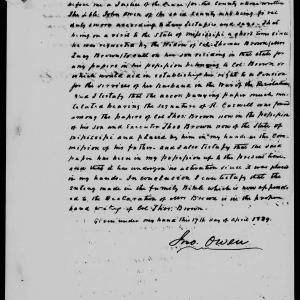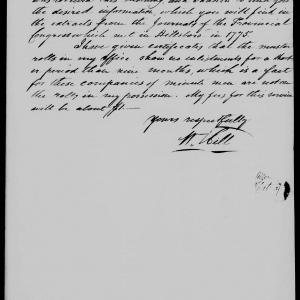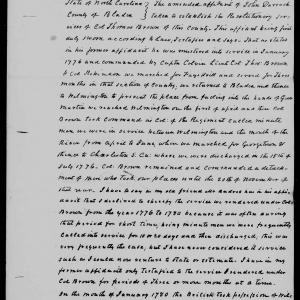Biographical Description
Thomas Brown was born in Bladen County, North Carolina on August 11, 1747. In 1766 he signed his name to a list of men from Bladen County who were protesting the Stamp Act. Then in 1771 he joined the force under General Hugh Waddell who went on an expedition to stop the Regulators in Alamance County. Despite his anti-Regulator actions, by the time of the American Revolution he had established himself as an outspoken Patriot and was a member of the Bladen County Committee of Safety in 1774.
In 1775 he was commissioned as a lieutenant colonel in the Bladen County Regiment of the North Carolina Militia and led men at the Battle of Moores Creek Bridge in February 1776. Shortly after that battle, he became the colonel of the 1st Battalion of Militia and brought troops down to Charleston, South Carolina to oppose an invading British force there. In 1778 he became the colonel of the Bladen County Militia and patrolled the border between North and South Carolina, attacking roving bands of loyalist forces. His first wife, Sarah Bartram, died on April 29, 1779. Brown then married Lucy Bradley at her father's house in Wilmington, North Carolina on January 13, 1780. In January or March 1781, he was wounded in the right arm at the Battle of Big Bridge, an injury he suffered from for the rest of his life. Sometime that summer he was captured by the British and kept in confinement at the Wilmington courthouse until November 1781. Although some records suggest that he was in command at the Battle of Elizabethtown in August 1781, Lucy Brown's affidavit suggests her husband was already imprisoned at this time.
Despite his injury during the war, Thomas Brown was still able to have a prosperous career after the Revolution. Although the three daughters he had with his first wife died as children, he and his second wife had at least five children together. Brown became a major general in the North Carolina Militia and served in the state senate from 1785-1787, in 1788, and in the North Carolina Executive Council in 1787. He also served in the NC General Assembly in 1808-1811. He was one of the largest landholders in Bladen County, owning thousands of acres and several plantations including Ashwood (later called Oakland), Sedgefield, and Walker's Bluff. By 1810 he owned 58 enslaved people and he bequeathed 40 named enslaved people to his relatives in his will. He died in Bladen County on November 23, 1814.
As Sender
Currently there are no documents available where this individual is the sender.
As Recipient
Currently there are no documents available where this individual is the recipient.
Additional Information
NC Encyclopedia:
Relationship
Wife
Relationship
Mother
Relationship
Father
Name
Relationship
Son
Name
Relationship
Son
Name Type:



